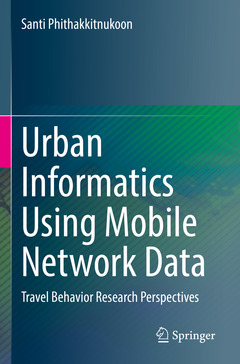Urban Informatics Using Mobile Network Data, 1st ed. 2023 Travel Behavior Research Perspectives

Santi Phithakkitnukoon is originally from Chiang Mai, Thailand. Santi is currently an Associate Professor with the Department of Computer Engineering, Faculty of Engineering, Chiang Mai University. He received B.S. and M.S. degrees in electrical engineering from the Southern Methodist University, USA, in 2003 and 2005, respectively, and a Ph.D. in computer science and engineering from the University of North Texas, USA. Before joining Chiang Mai University, he was a Lecturer in Computing with The Open University, U.K., a Research Associate with the Culture Lab (now known as Open Lab), Newcastle University, U.K., and a Postdoctoral Fellow with the SENSEable City Lab, Massachusetts Institute of Technology, USA. His research interest is in urban informatics, particularly in analyzing large-scale digital footprints such as mobile phone CDRs, GPS traces, social media data, and opportunistic sensing data sources to better understand human behavior and urban dynamics.
Date de parution : 12-2023
Ouvrage de 241 p.
15.5x23.5 cm
Disponible chez l'éditeur (délai d'approvisionnement : 15 jours).
Prix indicatif 168,79 €
Ajouter au panierDate de parution : 11-2022
Ouvrage de 241 p.
15.5x23.5 cm
